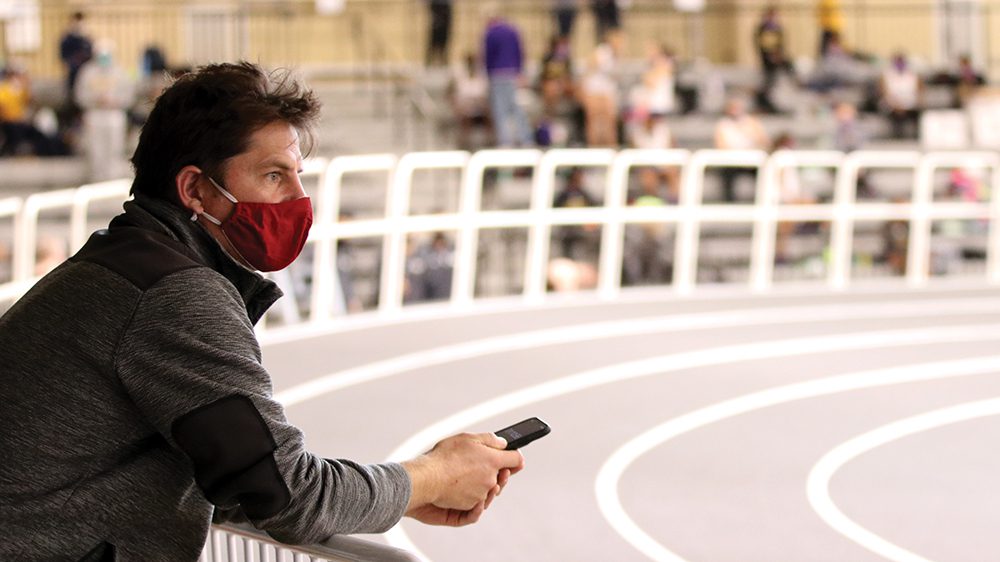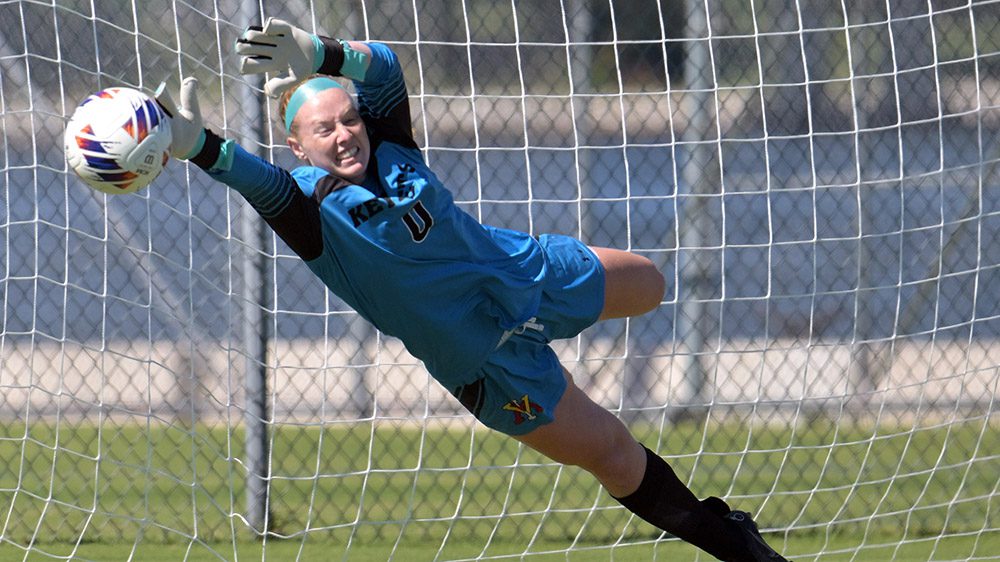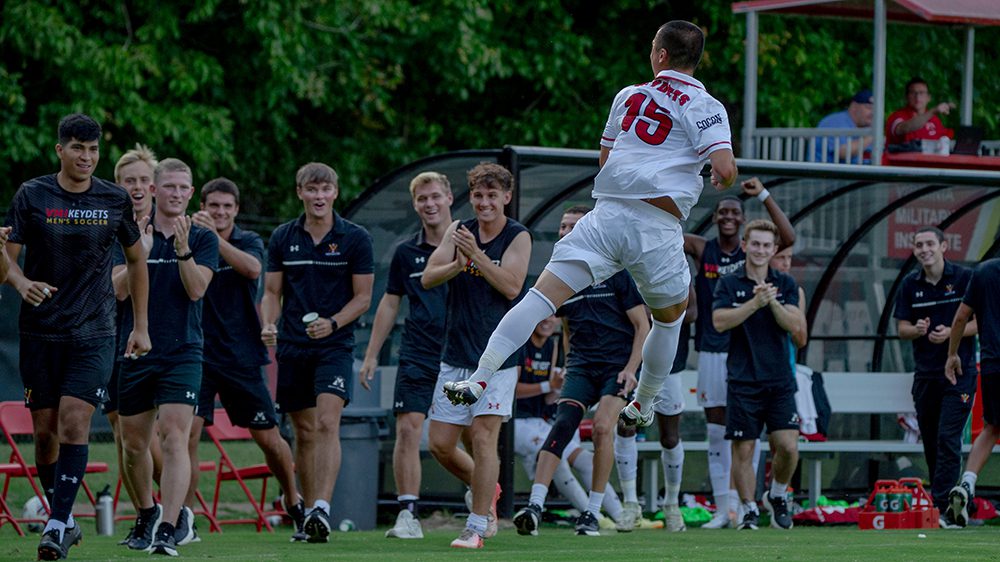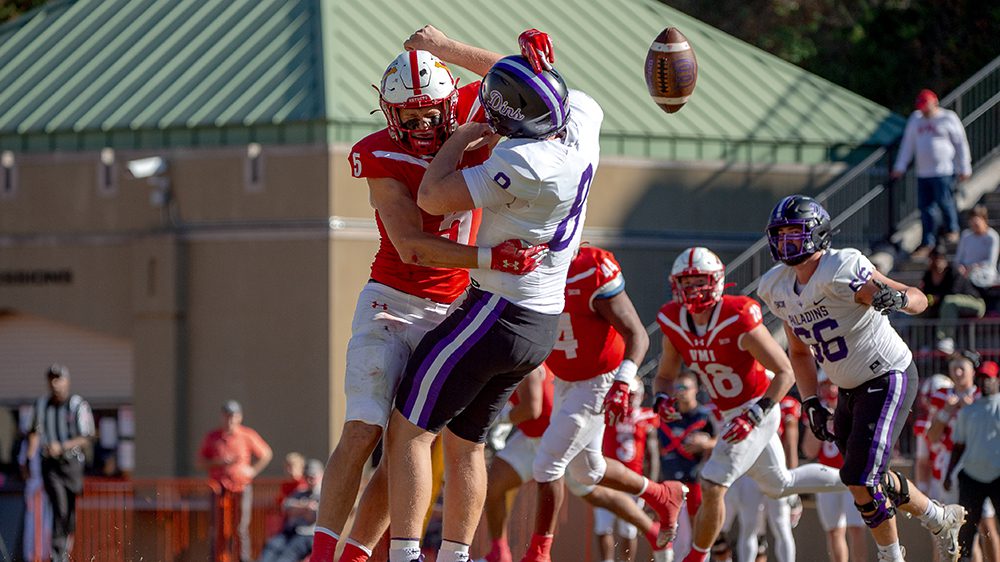He adjusts workouts quickly if an athlete is working too hard. He monitors and makes sure the athletes are “following the principles that will make them successful long-term.” Following these principles results in continuing success.
One of the most famous, and prolific—if the word can be applied to a running career—runners in U.S. history is Francie Larrieu Smith. She participated in five Olympic games, beginning when she was 19 and finishing in 1992, when she was 39.
Ludtke’s college coach, Greg Lautenslager, ran with Larrieu Smith’s group. From him, Ludtke learned how to carefully develop each runner to his or her best potential and focus on running longevity. Ludtke has followed this methodology and put his doctoral-level education in running to work, with demonstratable results. He’s coached multiple conference champion teams and many all-conference, division champion, and All-American athletes.
At VMI, the distance runners have seen continual improvement under his tutelage. At the 2020 Southern Conference championship meet, the men’s team finished second and the women were eighth. Two men, Jahanzib Shahbaz ’20 and Gavin Jenkins ’22, were named All-Southern Conference athletes for the second straight year. On the women’s side, Anna Armfield ’21 was the top VMI finisher at 15th—the top women’s finish in VMI history.
Before coming to VMI in 2015, Ludtke was looking to get back into Division I. VMI had several factors that interested him: New facilities, a tight-knit community for his family, trails and rural areas for long runs, and the intrinsic character of VMI’s cadets.
When he looked at VMI, the Corps Physical Training Facility was under construction—and it was a big draw for Ludtke. One the best facilities on the East Coast, he knew it would be tremendously helpful in recruiting. The seven-mile long Chessie Trail, which his team uses heavily, is an easy warmup jog down the road. When the team is further out from races, they’re easy to spot on Rockbridge County roads, including the Jacob’s Ladder route—a hilly, south-of-town loop with tremendous views of House Mountain.
Inside the CPTF, the athletes have designated exercise bicycles, ellipticals, and one anti-gravity treadmill. “If their legs are fatigued, they can still get a really good workout on the antigravity, the ellipticals, or the bikes,” Ludtke explained.
To use the anti-gravity treadmill, athletes strap on a bodysuit-like contraption. The machine inflates and supports the runner’s weight across their hips, thighs, and core area. On the machine, runners can opt to use less than 100% of their body weight, down to 20%.
“We can set the impact to a percentage where they feel no pain in their legs, but they will feel a workout in their heart and lungs,” Ludtke said.
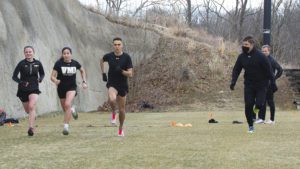
Ludtke putting Keydet cross-country runners through a workout. He often runs with or bicycles with the team on the roads and trails of Rockbridge County.—Photo by Micalyn Miller, VMI Alumni Agencies.
COVID-19 affected cross-country and track less than many other sports. The cross-country team stayed outside for all their fall practices. During the track seasons, Ludtke is also an assistant coach for the track team, coaching mostly the same runners. Normally, the team would have done some track workouts inside. During 2020-21 season, every workout has been outside. This helps “free up space [inside the CPTF] for the other events,” Ludtke said.
He’s adjusted routes for his runners—they don’t run through Lexington—and expanded running routes to areas with fewer people. The team’s trail courtesies have evolved, too: “We try to announce we’re coming or get off the trail if there are community members on the trail while we’re coming through.”
During the indoor track season—Ludtke is the meet director for VMI’s indoor track meets—the track and field team does not have to leave VMI to compete. Even the SoCon indoor track championships were at the CPTF. Other colleges were on long waiting lists for VMI meets, while the Keydets only had a quick stroll down the hill.
In normal—aka, non-pandemic—years, alumni come to cheer on the Keydets at various races.
“I always appreciated the alumni who attend events and are interested in cadets’ lives. I feel like we are really blessed at VMI to have such great alumni support,” Ludtke said. “They are amazingly supportive and I appreciate all of them.”
Before COVID-19, Ludtke and his wife, Jen, hosted evening running camps for the Lexington/Rockbridge community. In winter, community members of all ages were able to come to the CPTF to learn philosophies to keep them running healthy for a lifetime.
“We were looking for a way to serve the community and find a need the community had,” Ludtke said. “I wanted to use my skills with teaching running form and organizing workouts.” He’s worked in camp settings since 1995 and provides specialized expertise to the community.
Though billed as running camps, the Ludtkes quickly learned the camps had a broader appeal: Athletes in other sports were interested in learning running form. People who initially said, “Just sign me up for one day” or were “forced in by their parents” returned—and “were hooked” after a few sessions. “I was excited to work with people in an organized way, and to see some of their results over the six-week or nine-week period, just to see them grow and develop,” Ludtke said
He and Jen are looking forward to holding the camps again, once COVID-19 is under control. “I feel bad for the kids that are stuck at home,” with most sports and fitness opportunities unavailable, he said. Meanwhile, he’ll continue teaching Keydets to enjoy their running journeys.
His own coaching journey started the day his athletic eligibility was up. Ludtke began coaching “Mean Green” University of North Texas runners. He remained in Texas from 2000-02, coaching the men’s cross-country to a conference championship finish in 2000 and second-place finish in 2001. The men’s track team was also Sun Belt Champions in 2002.
He moved back to his alma mater, Lake Superior State, from 2002-05. There, he guided the team to growth in numbers, as well as 76 school records.
He coached at Illinois’ University of St. Francis from 2005-12. Here, he was named conference cross-country coach of the year in 2010 and in 2011. Thirteen of his athletes earned all-conference honors, and four (two men and two women) earned All-American honors. Ludtke coached at the University of Wisconsin at Oshkosh from 2012-15, where his team earned two Division III titles, three Division III runner-up awards, he was named the 2013 national co-coach of the year indoor track and field, and coached athletes to 14 NCAA individual titles as well as six NCAA all-time records.
